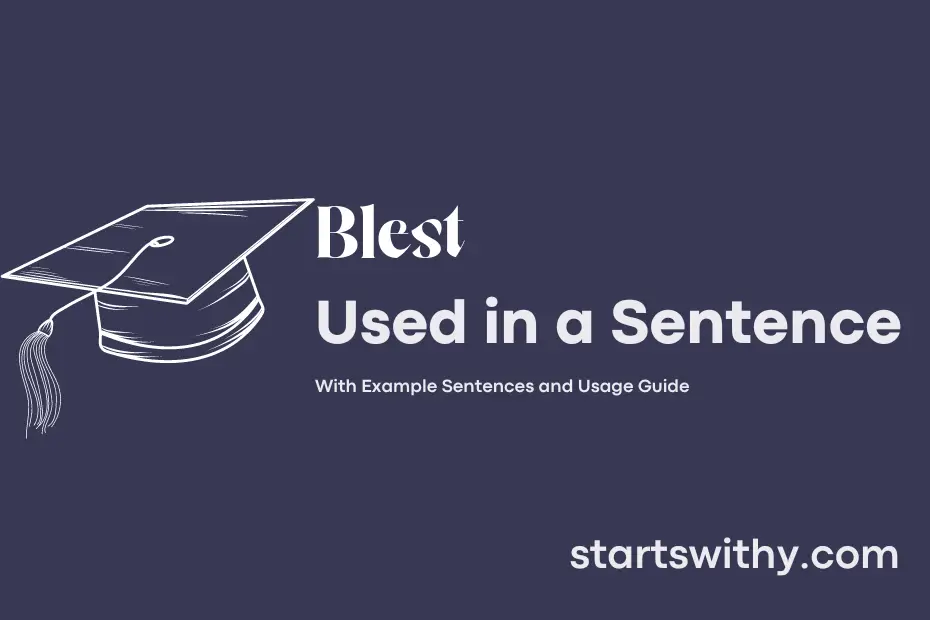Do you ever feel like you’ve been blessed by good fortune or divine favor? If so, you’ve experienced a moment of feeling “blest.” The word “blest” is used to convey a sense of being fortunate, happy, or privileged in a particular situation.
When someone uses the term “blest,” they are typically expressing gratitude or a sense of favor bestowed upon them. It’s a word often used in a religious or poetic context to acknowledge a feeling of being blessed or favored by a higher power.
7 Examples Of Blest Used In a Sentence For Kids
- Blest with good friends who always share.
- I feel blest when I see butterflies.
- We are so blest to have clean water to drink.
- Family is a very blest gift.
- I am blest to have food to eat every day.
- Being kind to others makes us feel blest.
- Every morning we are blest with a new day to learn and play.
14 Sentences with Blest Examples
- Blest with supportive friends who are always there to help me.
- I feel blest to have access to a well-stocked library on campus.
- I am truly blest to have a knowledgeable professor who inspires me.
- Being blest with a scholarship has eased my financial burden.
- I consider myself blest to have found a mentor who guides me in my academic journey.
- I feel blest to be studying at such a prestigious university.
- Blest to have the opportunity to participate in various extracurricular activities.
- I am blest with the opportunity to study abroad for a semester.
- Blest with access to high-speed internet for all my research needs.
- I feel blest to be surrounded by a diverse group of classmates.
- I am blest to have professors who are understanding and supportive.
- Blest with a campus that is conducive to both study and relaxation.
- I am blest with the chance to attend engaging workshops and seminars.
- Blest to have a student community that fosters growth and learning.
How To Use Blest in Sentences?
To use “blest” in a sentence, follow these steps:
-
Understand the meaning: The word “blest” is an archaic or poetic form of the word “blessed.” It is often used to express good wishes or to convey a sense of gratitude or happiness.
-
Choose the right context: “Blest” is typically used in a religious or formal setting to invoke a sense of divine favor or protection. It can also be used in poetic or literary works to add a poetic touch to the language.
-
Construct your sentence: When using “blest,” you can say something like, “I feel blest to have such wonderful friends,” or “May you be blest with love and happiness.”
-
Pay attention to verb tense: Remember that “blest” is the past tense and past participle form of “bless.” So if you are using it in a sentence, make sure it is correctly conjugated.
-
Practice using it: To become more comfortable using “blest” in sentences, try incorporating it into your everyday conversations or writing. This will help you become more familiar with how to use it correctly.
Overall, remember that “blest” is a versatile word that can add a touch of elegance or spirituality to your language. By following these steps and practicing its use, you can easily incorporate it into your vocabulary.
Conclusion
In conclusion, the word “blest” is an archaic form of “blessed” that is no longer commonly used in contemporary English. While it appeared in historical texts and religious contexts, it is not typically found in modern writing or conversation. Instances of “blest” may be seen in old poetry, religious texts, or traditional hymns, but its usage has largely fallen out of favor.
Therefore, when encountering the term “blest” in literature or historical documents, it is important to recognize it as an outdated form of the word “blessed” and to understand its context within the time period in which it was written. While “blest” may hold historical significance, its usage today is limited, and the more familiar form “blessed” is now the preferred choice in contemporary language.



